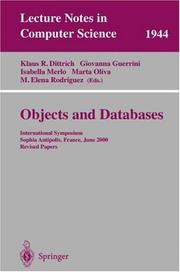| Listing 1 - 2 of 2 |
Sort by
|

ISBN: 3540416641 354044677X Year: 2001 Volume: 1944 Publisher: Berlin, Heidelberg : Springer Berlin Heidelberg : Imprint: Springer,
Abstract | Keywords | Export | Availability | Bookmark
 Loading...
Loading...Choose an application
- Reference Manager
- EndNote
- RefWorks (Direct export to RefWorks)
These post-proceedings contain the revised versions of the papers presented at the Symposium on Objects and Databases" which was held in Sophia-Antipolis, France, June 13, 2000, in conjunction with the Fourteenth European Conference on Object-Oriented Programming, ECOOP 2000. This event continued the t- dition established the year before in Lisbon (Portugal) with the First Workshop on Object-Oriented Databases. The goal of the symposium was to bring together researchers working in various corners of the eld of objects and databases, to discuss the current state of research in the eld and to critically evaluate existing solutions in terms of their current usage, their successes and limitations, and their potential for new applications. The organizing committee received 21 papers which were reviewed by a p- gram committee of people active in the eld of objects and databases. There were 3 reviews for each paper, and nally the organizing committee selected 9 long papers, 2 short papers, and a demonstration to be presented and discussed at the symposium. The selected papers cover a wide spectrum of topics, including data modeling concepts, persistent object languages, consistency and integrity of persistent data, storage structures, class versioning and schema evolution, query languages, and temporal object-oriented databases. In addition to the regular papers, the symposium included an invited p- sentation, given by Prof. Malcolm Atkinson from the University of Glasgow (Scotland) where he heads the Persistence and Distribution Group.
Object-oriented programming (Computer science) --- Database management --- Computer Science --- Engineering & Applied Sciences --- Computer science. --- Computer programming. --- Programming languages (Electronic computers). --- Data structures (Computer science). --- Database management. --- Computer Science. --- Programming Languages, Compilers, Interpreters. --- Data Structures, Cryptology and Information Theory. --- Database Management. --- Programming Techniques. --- Data base management --- Data services (Database management) --- Database management services --- DBMS (Computer science) --- Generalized data management systems --- Services, Database management --- Systems, Database management --- Systems, Generalized database management --- Electronic data processing --- Information structures (Computer science) --- Structures, Data (Computer science) --- Structures, Information (Computer science) --- File organization (Computer science) --- Abstract data types (Computer science) --- Computer languages --- Computer program languages --- Computer programming languages --- Machine language --- Languages, Artificial --- Computers --- Electronic computer programming --- Electronic digital computers --- Programming (Electronic computers) --- Coding theory --- Informatics --- Science --- Programming --- Data structures (Computer scienc. --- Data Structures and Information Theory.
Book

ISBN: 3110740303 3110741229 Year: 2022 Publisher: Berlin ; Boston : De Gruyter,
Abstract | Keywords | Export | Availability | Bookmark
 Loading...
Loading...Choose an application
- Reference Manager
- EndNote
- RefWorks (Direct export to RefWorks)
While the very existence of global literary studies as an institutionalised field is not yet fully established, the global turn in various disciplines in the humanities and the social sciences has been gaining traction in recent years. This book aims to contribute to the field of global literary studies with a more inclusive and decentralising approach. Specifically, it responds to a double demand: the need for expanding openness to other ways of seeing the global literary space by including multiple literary and cultural traditions and other interdisciplinary perspectives in the discussion, and the need for conceptual models and different case studies that will help develop a global approach in four key avenues of research: global translation flows and translation policies, the post-1989 novel as a global form, global literary environments, and a global perspective on film and cinema history. Gathering contributions from international scholars with expertise in various areas of research, the volume is structured around five target concepts: space, scale, time, connectivity, and agency. We also take gender and LGBTQ+ perspectives, as well as a digital approach.
LITERARY CRITICISM / General. --- Cultural transfer. --- Globalization. --- Literary circulation. --- Literary translation.
| Listing 1 - 2 of 2 |
Sort by
|

 Search
Search Feedback
Feedback About UniCat
About UniCat  Help
Help News
News